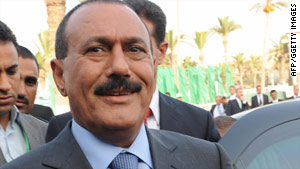Meet the Siberian Liberation Army
BY JOSHUA KUCERA | DECEMBER 28, 2009

IRKUTSK, Russia -- When you're the leader of a fringe political group, a cafe called "I'm Waiting for a UFO" may not be the best place to take a visiting journalist. But it's possible that alien abduction is more likely than what Mikheil Kulekhov is working for: Siberian independence.
Kulekhov was the head of the Siberian Liberation Army until officers from the FSB (the successor to the KGB) contacted him. "They asked me: 'Why are you calling yourselves an army? Are you going to take up arms?'" Assured that wasn't the case, the officers asked Kulekhov to change the organization's name. He did, and it is now the National Alternative of Siberia. (The two names share the same acronym in Russian, OAS, he points out.)
That Russian security let these would-be secessionists off with nothing more than a gentle scolding is probably a reflection of the group's modest size: Kulekhov counts about 30 members in the OAS. So, Siberia is not Chechnya.
Siberian independence is unlikely. But this region's long-term political and economic future is uncertain. Much of the oil and natural gas that has fueled Russia's booming economy over the last decade is found in eastern Siberia, and the area is also rich in timber, minerals, and other natural resources. But it doesn't have very many people. This was the last part of Russia to be settled, and the Russian history of much of eastern Siberia stretches back barely 100 years.
Contrary to Siberia's reputation, most of the cities I visited were pleasant -- Irkutsk, in particular, has gracious architecture and a bookish college-town feel. Siberians boast that they tend to be smarter and better-looking than their compatriots, because so much of Russia's elite was shipped out here when Siberia was used as a penal colony. But life here has always been difficult; it's remote and, in the winter, bitterly cold. The Soviets encouraged Russians to settle here, but after the collapse of the Soviet Union, people started heading west: The population of Russia east of Irkutsk decreased from 8 million to 6 million between 1998 and 2002 (the date of the last census). What would this mass exodus mean for Russia? Perhaps Russia's greatest claim to being a great power is its immense size, and a shrinking population in its farthest reaches could call its claim on Siberia -- and by extension its authority on the world stage -- into question. I was traveling through this region, heading east from Irkutsk, to see how Russia is holding on to its Far East.




